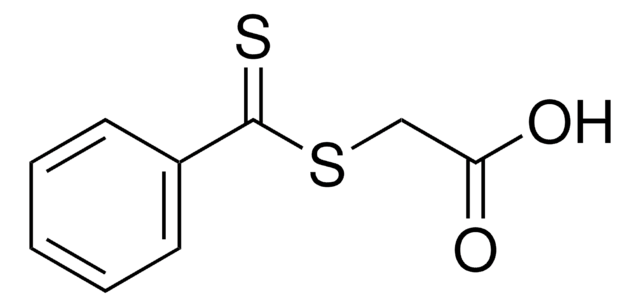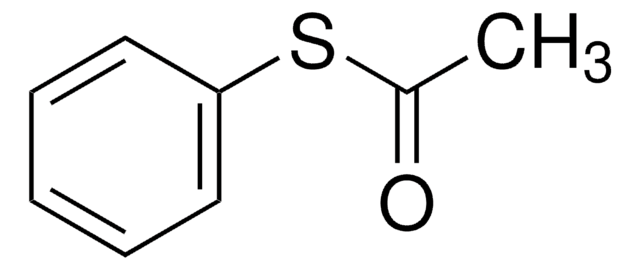731269
2-Phenyl-2-propyl benzodithioate
99% (HPLC)
Synonym(s):
2-Phenylpro-2-yl dithiobenzoate, Benzenecarbodithioic acid 1-methyl-1phenylethyl ester, Cumyl dithiobenzoate
About This Item
Recommended Products
Assay
99% (HPLC)
form
solid
density
1.125 g/mL at 25 °C
SMILES string
CC(C)(SC(=S)c1ccccc1)c2ccccc2
InChI
1S/C16H16S2/c1-16(2,14-11-7-4-8-12-14)18-15(17)13-9-5-3-6-10-13/h3-12H,1-2H3
InChI key
KOBJYYDWSKDEGY-UHFFFAOYSA-N
General description
Application
Signal Word
Warning
Hazard Statements
Precautionary Statements
Hazard Classifications
Acute Tox. 4 Oral - Aquatic Acute 1 - Aquatic Chronic 1
Storage Class Code
11 - Combustible Solids
WGK
WGK 3
Flash Point(F)
219.9 °F
Flash Point(C)
104.4 °C
Regulatory Listings
Regulatory Listings are mainly provided for chemical products. Only limited information can be provided here for non-chemical products. No entry means none of the components are listed. It is the user’s obligation to ensure the safe and legal use of the product.
FSL
Group 4: Flammable liquids
Type 3 petroleums
Hazardous rank III
Water insoluble liquid
JAN Code
731269-1G:
731269-5G:
731269-BULK:
731269-VAR:
Choose from one of the most recent versions:
Already Own This Product?
Find documentation for the products that you have recently purchased in the Document Library.
Customers Also Viewed
Articles
RAFT polymerization uses commercial agents to control polymer properties without cytotoxic heavy metals like ATRP.
RAFT polymerization offers living characteristics to radical polymerization, contributing versatility to reversible deactivation radical polymerization methods.
Over the past two decades, the rapid advance of controlled living polymerization (CLP) techniques.
The modification of biomacromolecules, such as peptides and proteins, through the attachment of synthetic polymers has led to a new family of highly advanced biomaterials with enhanced properties.
Protocols
RAFT polymerization offers precise control, enabling tailored synthesis of complex polymer structures.
We present an article about RAFT, or Reversible Addition/Fragmentation Chain Transfer, which is a form of living radical polymerization.
We presents an article featuring procedures that describe polymerization of methyl methacrylate and vinyl acetate homopolymers and a block copolymer as performed by researchers at CSIRO.
Polymerization via ATRP procedures demonstrated by Prof. Dave Haddleton's research group at the University of Warwick.
Our team of scientists has experience in all areas of research including Life Science, Material Science, Chemical Synthesis, Chromatography, Analytical and many others.
Contact Technical Service

![4-Cyano-4-[(dodecylsulfanylthiocarbonyl)sulfanyl]pentanoic acid 97% (HPLC)](/deepweb/assets/sigmaaldrich/product/structures/204/925/30ae6ca0-5b0b-4963-a061-7e5e3d1a85af/640/30ae6ca0-5b0b-4963-a061-7e5e3d1a85af.png)















